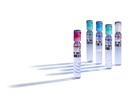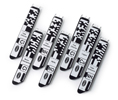-
Products
-
Lab Instruments
Titration Systems Other Instruments
-
Lab Meters and Probes
Calibration Standards Other Meters and Probes
- Chemistries, Reagents, and Standards
-
Online Analyzers
EZ Series Analysers
- Iron
- Aluminium
- Manganese
- Phosphate
- Chloride
- Cyanide
- Fluoride
- Sulphate
- Sulphide
- Arsenic
- Chromium
- Copper
- Nickel
- Zinc
- Ammonium
- Total Nitrogen
- Phenol
- Volatile Fatty Acids
- Alkalinity
- ATP
- Hardness
- Toxicity
- Sample Preconditioning
- Boron
- Colour
- Nitrate
- Nitrite
- Silica
- Hydrogen Peroxide
- EZ Series Reagents
- EZ Series Accessories
- EZ sc Series Inorganics
- EZ sc Series Metals
- EZ sc Series Nutrients
- Flow and Collections
-
Online Sensors and Controllers
Conductivity Sensors
- 3400 Analogue Contacting
- 3400 Digital Contacting
- 3700 Analogue Inductive
- 3700 Digital Inductive
- 9523 Cation Conductivity
- Multiparameter Online Panels
- Claros Water Intelligence System
- Test Kits & Strips
-
Microbiology
Prepared Media
- BARTS
- Liquid MPN
- MUG Tube
- Membrane Filtration
- Paddle Testers
- Presence-Absence
- Total Count Media
- Yeast and Mold
Labware- Accessories
- Funnels, Pumps & Manifolds
- Microbiology Filters
- Petri Dishes & Accessories
- Sampling Bags
- Vials, Tubes, Bottles & Racks
-
Lab Equipment and Supply
ApparatusInstruments Glassware/PlasticwareGeneral Lab Consumables Safety Equipment Books and Reference Material
- Samplers
- Industrial UV
- Electrochemistry
-
Lab Instruments
- Parameters
- Industries
- Support
- Service
- e-Shop
- Brands
2100Q Portable Turbidimeter
Easiest calibration and verification with accurate results every time!
The Hach 2100Q and 2100Q IS Portable Turbidimeters offer unsurpassed ease of use and accuracy in turbidity measurement. Only Hach offers this unique combination of advanced features, such as assisted calibration and simplified data transfer, and measurement innovation, giving you accurate results every time.
Easy Calibration and Verification
Be confident your measurements are right every time with on-screen assisted calibration and verification. You save time and get accurate results with an easy-to-follow interface that eliminates the need to reference complicated manuals in order to perform routine calibrations. Single-standard RapidCal™ calibration offers a simplified solution for low level measurements.
Simple Data Transfer
Data transfer with the 2100Q is simple, flexible, and doesn’t require additional software. This feature requires the USB + Power module. All data can be transferred to the module and easily downloaded to your computer with a USB connection, providing superior data integrity and availability. With two different module options, you can customize connectivity and power to meet your specific needs.
Accuracy for Rapidly Settling Samples
The Hach 2100Q Portable Turbidimeter incorporates an innovative Rapidly Settling Turbidity™ (RST) mode to provide accurate, repeatable measurements for difficult to measure, rapidly settling samples. An exclusive algorithm that calculates turbidity based on a series of automatic readings eliminates redundant measurements and estimating.
Convenient Data Logging
Up to 500 measurements are automatically stored in the instrument for easy access and backup. Stored information includes: date and time, operator ID, reading mode, sample ID, sample number, units, calibration time, calibration status, error messages and the result.
Two Models for Specific Requirements
- 2100Q Turbidimeter – Compliant with USEPA Method 180.1 design criteria.
- 2100Q IS Turbidimeter – Compliant with ISO 70727 design criteria.
Features: 2100Q compared to the 2100P Portable Turbidimeter
| Feature | 2100P | 2100Q |
|---|---|---|
| On-screen, assisted operation | • | |
| Verify calibration function | • | |
| RapidCal single standard calibration | • | |
| Rapidly Settling Turbidity mode | • | |
| Data log | • | |
| Data transfer without special software | • | |
| Two-detector optical system | • | • |
| Range: 0-1000 NTU | • | • |
| Resolution: 0.01 on lowest range | • | • |
Key Features
On-Screen Assisted Calibration and Verification
The 2100Q gives you confidence that your results are accurate, without having to read long manuals for calibration and verification instructions. All the core measurement information is on a single screen.
On-Screen Assisted Calibration
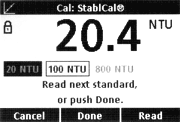
In the full calibration mode (0 to 1000 NTU), the text-based, assisted calibration feature walks you through clear and easy steps, and verifies the accuracy of your calibration automatically. This on-screen assistance eliminates the need for a manual and provides assurance that your calibration is complete and valid.
Verification with the Push of a Button
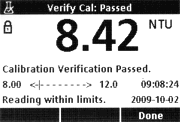
Be confident in your measurement by running the quick and easy Verify Cal function using the included 10 NTU StablCal primary standard.
RapidCal Single Standard Calibration
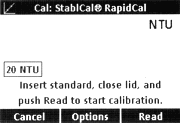
In the range up to 40 NTU, the single standard RapidCal calibration mode reduces calibration complexity by eliminating multiple standard full calibrations. You save time and ensure you meet reporting requirements.
Rapidly Settling Turbidity ™ (RST) Mode
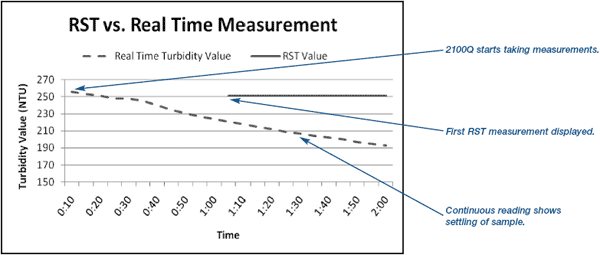
At the request of our customers, Hach has developed an innovative solution to alleviate the uncertainty caused by changing turbidity readings in samples that quickly settle. The 2100Q’s RST reading mode uses an exclusive algorithm that reverse calculates and continuously updates a calculated value of turbidity to a point in time when the sample begins to settle out of solution based upon the accumulated trend of the measured values. This results in values that are more accurate and repeatable than those obtained using traditional smoothing techniques, such as averaging.
Although the sample continuously settles out of solution, the RST calculated value does not change. No more guessing and no more replicate runs —you get the the right answer every time.





 Recurring Orders
Recurring Orders 